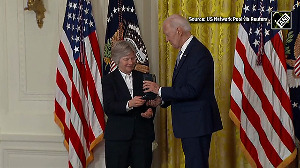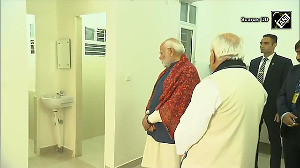Infotech corridors in the southern states are witnessing feverish activity these days.
The corridors in Chennai, Hyderabad and Bangalore are vying to provide state-of-the-art facilities to get a larger share of the investments pouring into the IT sector from multinational companies.
Bangalore, being an early starter, already has a good lead in the race in attracting investments. IBM, Lucent, Texas Instruments, Motorola, Nortel and CISCO, to name a few, already have a strong presence in the garden city.
Randeep Sudan, special secretary to chief minister, ex-officio IT, Andhra Pradesh, said, "The crucial differentiator of competitiveness between the three IT corridors would be the availability of talented professionals."
Sudan added, "We are not competing with the other two IT corridors, as we are progressively developing Hyderabad to international standards. The November 2002 edition of National Geographic magazine included Hyderabad in the list of the four cities it described as future cities of the world."
"We are aggressively targeting multinational companies to set-up their companies in the IT corridor by developing the satellite infrastructure of the city. Microsoft has taken 45 acres of land near Manikonda. This would be the company's largest campus outside the United States," he said.
Software exports from Andhra Pradesh was pegged at Rs 3,668 crore (Rs 36.68 billion) in 2002-03 and is expected to cross the Rs 5,000-crore (Rs 50 billion) mark during the current fiscal.
State officials in Tamil Nadu and Karnataka were unavailable for comments.
Ramesh Nair, senior manager-corporate solutions, Jones Lang LaSalle India said, "Innovation in transport infrastructure, planned layouts, housing and education would be the defining elements that would distinguish one corridor from the other."
Despite better infrastructure in terms of power, international air connectivity and a lower cost of living, Chennai had initially lost out to Bangalore.
Another factor that drives multinational IT companies to prefer one corridor over the other is the availability of ready-to-occupy built up commercial space.
Realtors who spoke to Business Standard said on this front Bangalore had a clear edge over Chennai and Hyderabad.
Despite being a late starter, Chennai is also catching up fast. The first phase of a new IT complex, spread over five acres, is expected to be ready by October, 2004.
Quick approvals from concerned state government authorities, according to the realtors, have also helped the Bangalore IT corridor to attract copious investment, compared with its Chennai and Hyderabad counterparts.
Thirumal Govindraj, head operation-Chennai, C B Richard Ellis, said, "Indian and multinational IT and ITES companies setting up own campuses want fast single window clearance from the approval agencies concerned."
Real estate consultants also believe that the availability of skilled manpower is an equally important factor that multinational IT companies keep in mind when selecting a particular city.
"The most important reason for selecting any particular IT corridor depends on the availability of skilled manpower in the region," Nair added.
The Tamil Nadu government will constitute a special purpose vehicle -- IT Expressway Ltd -- to undertake the implementation of a six-lane expressway project of international standards.
The Tamil Nadu Road Development Corporation will take up the project on public-private partnership at a cost of about Rs 70 crore (Rs 700 million).
The six-lane expressway is expected to be completed by the end of 2004. The expansion plan for the IT corridor in Bangalore covers a 23-km stretch between Whitefield and the Electronics City.
This corridor is expected to be planned with active assistance and consultation from reputed international agencies that have complete experience in IT parks.
The corridor will provide for the best quality IT parks. Real estate consultants said the success of IT corridors would depend on the speed at which a built-to-suit model could be implemented in these corridors.
What the tech giants look for
- Innovation in transport infrastructure, planned layouts, housing and education.
- Availability of ready-to-occupy built up commercial space.
- Better infrastructure in terms of power, international air connectivity and a lower cost of living.
- Fast single-window clearance from the approval agencies concerned.
- Availability of talented professionals.






 © 2025 Rediff.com -
© 2025 Rediff.com -